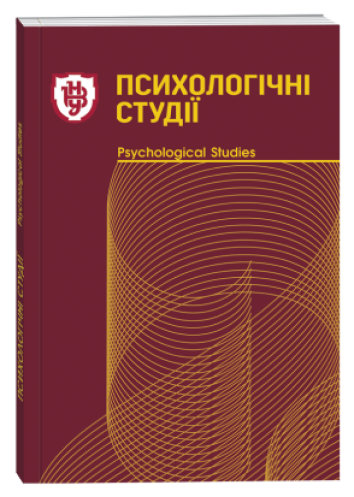PROFESSIONAL WELL-BEING IN THE PERSONALITY SELF-REGULATION SYSTEM: THEORETICAL MODEL
DOI:
https://doi.org/10.32782/psych.studies/2024.1.2Keywords:
professional well-being, self-regulation, needs, value priorities, structural-functional modelAbstract
Many different descriptions of personal well-being in the professional context exist in the scientific literature, which indicates the lack of a sufficient theoretical base and a generally accepted idea about professional well-being, as well as the need to clarify the meaning of this concept and its psychological mechanism. The models available today are characterized by a variety of structural elements, often overloaded with components and do not always represent a clear mechanism for the formation of the professional well-being of an individual. The purpose of this research is the theoretical development and substantiation of the structural-functional model of professional well-being of the individual. The conceptual basis of the model is A. Maslow's motivational theory. Professional well-being is considered as an integrated state that is formed in connection with the extent to which individual needs are realized in professional activity, taking into account individual values and meanings. Attributing well-being to the category of mental states of the individual is the basis for studying this phenomenon in the context of the system of self-regulation of the consistency of personal needs, goals, and value priorities with the possibility of their implementation in professional activity. When the level of professional well-being decreases, the value-semantic system of the individual acts as a mediator, which strengthens the motivation for change and contributes to its preservation in case of minor differences between the real and the desired in the professional sphere. A decrease in satisfaction with certain aspects of professional activity, which arises in response to the inconsistency of a person's capabilities with his needs and life values, leads to their rethinking. As a result, these aspects acquire additional value and increase human motivation for transformative activity aimed at their implementation. The construction of a structural and functional model of professional well-being in the system of self-regulation allows us to reveal the logic of its formation. The perspective of further research is the empirical verification of the proposed model.
References
Voitenko E. Occupational Well-Being: A Comparative Analysis of the Main Structural Models. International Journal of Behavior Studies in Organizations, 2022. V.7. P. 30–39.
Glavinska O., Ovdiyenko I., Brukhovetska O., Chausova T., Didenko M. Professional Self-Realization as a Factor in the Psychological Well-Being of Specialists of Caring Professions. Journal of Intellectual Disability-Diagnosis and Treatment, 2020. V. 8 (3), P. 548–559.
Schultz M.L. Occupational Well-Being: the development of a theory and a measure: an abstract of a dissertation. Kansas State University. Manhattan, Kansas, 2008. 183 p.
Волинець Н. В. Теоретична модель психологічного благополуччя особистості: параметри, критерії, показники та функції. Науковий вісник Херсонського державного університету. Серія : Психологічні науки. 2018. Вип. 1(1). С. 50-62.
Maslow A.H. Motivation and Personality. New York: Harper & Row. 1970. 399 p.
Diener E., Lucas R. E., Oishi S. Advances and open questions in the science of subjective well-being. Collabra: Psychology, 2018. V. 4(1), 15.
Joshanloo M., Weijers D. A two-dimensional conceptual framework for understanding mental well-being. PLoS ONE, 2019. V. 14(3), e0214045.
Ryan R. M., Deci, E. L. On happiness and human potentials: A review of research on hedonic and eudaimonic well-being. Annual Review of Psychology,2001. V. 52, P. 141–166.
Seligman M. Flourish: A Visionary New Understanding of Happiness and Well-being. New York: Atria, 2012. 368 p.
Bergis T. Special characteristics of the system of values and the subjective well-being of a person at the stage of adulthood. 2018. URL: https://doi.org/10.18323/2221-5662-2018-3-58-63
Романюк Л.В. Становлення цінностей особистості: Концептуальна модель та її методологічний потенціал. Психологія особистості. 2013. № 1(4). С. 138–148.
Schwartz SH, Bilsky W. Toward a theory of the universal content and structure of values: extensions and cross-cultural replications. Journal of Personality and Social Psychology, 1990. V. 58(5), P. 878–891.
Maslow A. The farther reaches of human nature. New York: Penguin. 1993. 432 p.
Гречко Т.П. Загальна характеристика основних психічних станів особистості. Вісник Національної академії Державної прикордонної служби України. Психологічні науки. 2010. №3.
Voitenko E., Myronets S., Osodlo V., Pozdnyshev Y., Hordynia N. The specifics of the perceptions of professional well-being by teachers of higher educational institutions in Ukraine. Revista Conrado, 2022. V. 18(88), P. 44–53.
Sheldon K. M., Elliot A. J. Goal striving, need satisfaction, and longitudinal well-being: The self-concordance model. Journal of Personality and Social Psychology, 1999. V. 76, P. 482– 497.
Siegrist J. Adverse health effects of high-effort/low-reward conditions. Journal of occupational health psychology, 1996. V. 1(1), P. 7–41.
Lyubomirsky S., King L., Diener E. The benefits of frequent positive affect: Does happiness lead to success? Psychological Bulletin. 2005. Vol. 131. N 6. P. 803—855.
Юрченко В.І. Теоретико-методологічні засади дослідження психічних станів людини: автореф. дис… д-ра психол. наук: 19.00.01 / Інститут психології ім. Г.С.Костюка НАПН України. Київ, 2009. 38 с., с. 31.
Миронець С.М., Тімченко О.В. Негативні психічні стани рятувальників в умовах надзвичайної ситуації: Монографія. К.: ТОВ "Август Трейд", 2008. 249 с.
Cooper SJ. From Claude Bernard to Walter Cannon. Emergence of the concept of homeostasis. Appetite. 2008. V. 51. P. 419–427.







